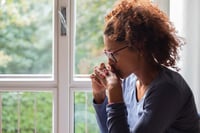Americans Report Increasing Rates of Anxiety, APA Poll Finds

Sixty-two percent of Americans reported feeling more anxious this year compared with last year, according to a public opinion poll released this week by APA. In the past three years, between 32% and 39% reported feeling more anxious compared with the year prior.
“It’s not surprising that more Americans are anxious, given the circumstances we all find ourselves in this year,” APA President Jeffrey Geller, M.D., M.P.H., said in a news release. “However, given the huge jump in anxiety, coupled with the impact the pandemic is having on those who were already living with mental illness or substance use disorders, the most important thing that we can do as a country is to invest in our mental health system.”
The APA-sponsored poll was conducted September 14 to 16 through an online survey of a demographically representative U.S. sample of 1,004 adults aged 18 or older. The survey has a margin of error of +/- 3.1 percentage points.
Some of the top causes of anxiety that respondents reported included keeping themselves or their families safe (80%), COVID-19 (75%), gun violence (73%), and the 2020 presidential election (72%). Compared with a APA poll in March on COVID-19 and mental health, there was little change in the percentage of respondents reporting that the COVID-19 pandemic has had a serious impact on their mental health (36% in March vs. 37% in September).
Fifty-seven percent of respondents reported that they were more anxious about the outcome of the presidential election than prior election years, and 61% indicated that the impact of politics on their daily lives was making them extremely or somewhat anxious.
The poll also showed that 67% of Americans are somewhat or extremely anxious about the impact of climate change on the planet, and more than half were somewhat or extremely anxious about the impact of climate change on their own mental health.
The poll also asked respondents about the impacts of racism on mental health: 76% strongly or somewhat agreed that systemic racism impacts the mental health of Americans, especially people of color.
“The impact of structural inequities on the mental health of the Black community is far reaching, and each of us as psychiatrists has a vital role to play in tackling these issues,” Geller said. “On a basic level, we must continue to strive to diversify the ranks of our profession and provide culturally responsive care to our patients.”
Regarding gun violence, 83% of respondents agreed that gun violence represents a public health threat, while 78% said Congress should do more to address gun violence, including violence from mass shootings.
For related information, see the Psychiatric News article “COVID-19 Pandemic is Taking MH Toll, Finds APA Poll.”
(Image: iStock\tommaso79)
How Does Racism Impact Your Practice? APA Task Force Survey Closes Today
The APA Presidential Task Force on Structural Racism Throughout Psychiatry is fielding a short survey on the impacts of racism on psychiatric practice. Help inform the task force’s important work and share your thoughts by the end of the day today, Friday, October 23. Learn more about the task force and view the results of its previous two surveys on the task force webpage.
Don't miss out! To learn about newly posted articles in Psychiatric News, please sign up here.






